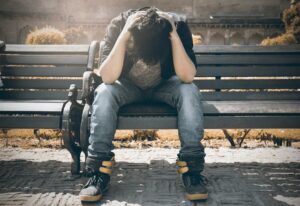To comment or receive more such wisdom, please register on www.gyanalogy.com/login
Mental ill-Health - not a personal problem!

In India, WHO estimates that the burden of mental health problems is of the tune of 2,443 DALYs per 100,000 population, and the age-adjusted suicide rate per 100,000 population is 21.1. It is estimated that, in India, the economic loss, due to mental health conditions, between 2012-2030, is 1.03 trillion dollars. 42.5%of corporate employee suffers from one or the other from Depression or Anxiety in India. (UK Charity 2019). This is pre- COVID19 data.
I want you to imagine a straight line going left to right. On the left where the line begins, are people who have no issues in life and as you move along the spectrum there are people you have some issues and they increase as you as you go further with mental illnesses on the extreme right. Where do you think you will lay? I would oscillate somewhere a little ahead of the extreme left and mid of the spectrum maybe, depending on life and my inability to cope or be resilient.
Mental Ill-health is a loss of human potential. Continued mental health problems impact people’s decision making, everyday adjustments, productivity, relationships and social behaviour. High stigma, misinformation and high treatment gap make it a very lonely journey for someone already struggling with Mental Ill-health. Add to this the impact their struggle has on the family, caregivers, peers and friends.
Prevention, management and coping with mental health problems can be done very effectively with learning emotional, behavioural and thought skills. Having said that, most people do not understand what Mental Ill-health is.
As I said Mental Ill-health isn’t a personal problem. Imagine someone struggling in life, and continuing to do so without seeking professional help. The loss of this person would be of his intellect, his emotions, his behaviour, how he interacts with his peers and family, what and how he thinks of himself. When we go through this maladjustment continuously, our mind and body is constantly fatigued and we develop unhelpful patterns of coping which make life more difficult. As a family, you see the person change and can do nothing about it. Sometimes, you may show a brave face and may pretend everything is all right making it even worse for yourself.
The impact this struggle has on oneself, family and above all the loss of quality if life. Imagine being from a socially backward group, a class that's discriminated against, policies that do not support you, a healthcare system that’s inadequate and unsupportive. All of this together influences a person's mental health, resilience and their life quality. It is like a hand in glove situation.
What one can do to make it better is to educate oneself about mental health, seek timely and appropriate professional help. Recognise a pattern of behaviour, continued emotional upset and changes in a person, over a period of time and assist them in seeking help.

Snigdha Mishra is a Psychotherapist, Trainer and Life Coach. She is the Founder of Life Surfers and The Mind-Life Project. She is also Secretary – Training & Supervision at Bharatiya Counselling Psychology Association and Co-Founder Let’s Talk. She has training and expertise in Cognitive and Rational Emotive Behaviour Therapies, Clinical Hypnotherapy. Snigdha has training in CBT from The Beck Institute, Philadelphia, USA and is a certified Corporate Social Responsibility Trainer from Indian Institute of Corporate Affairs, under the Ministry of Corporate Affairs, India.
The views, thoughts, and opinions expressed in the article belong solely to the author.
To comment or receive more such wisdom, please register on www.gyanalogy.com/login



